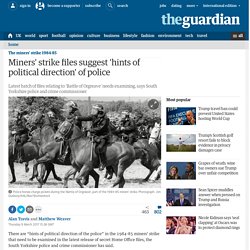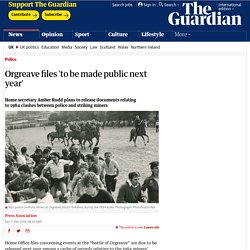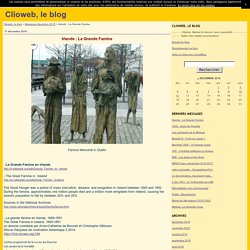

Hillsborough police chief to face manslaughter trial. The prosecution for manslaughter of David Duckenfield, the former South Yorkshire police chief superintendent who was in command when scores of people were killed during the 1989 FA Cup semi-final at Hillsborough, is to continue to trial, a judge has ruled.

Criminal charges against four other men in relation to the disaster, which left 96 people dead, and its aftermath will also go to trial after the judge, Sir Peter Openshaw, rejected the defendants’ applications for them to be dismissed. Openshaw decided that a legal bar – a “stay” on prosecuting Duckenfield, which was imposed by the judge Mr Justice Hooper when he heard the bereaved families’ private prosecution of Duckenfield in 2000 – should be lifted. The Crown Prosecution Service announced last June that it intended to prosecute Duckenfield, following the holding of new inquests from 2014-16, and applied for the stay to be lifted.
70 years of the NHS: a revolution that is reborn every day. Rex Makin obituary. Until 1986, legal services could not be advertised in the UK, but the Liverpool solicitor Rex Makin, who has died aged 91, was ahead of the game in making his name widely known.

Through a succession of high profile cases, he became the “go to” solicitor on Merseyside. For anyone accused of a criminal offence or injured in an accident, the immediate thought was to “get Rex”. ‘An almost biblical notion of evil’ – why Ian Brady haunts the British psyche. He has been, for half a century, “the most hated man in Britain”, the walking embodiment of evil, an unrepentant Antichrist and exhibit No 1 in the argument for bringing back the death penalty.

Now he has departed in a final irony: the man whom many would have cheerfully killed with their bare hands was denied for years by medical science and the laws of the land his desire to end his own life. Ian Brady was the main protagonist in the Moors murders, a title that now has the echo of an old horror film rather than the grim reality of the killing of five children – Pauline Reade, John Kilbride, Keith Bennett, Lesley Ann Downey and Edward Evans.
Along with his accomplice, Myra Hindley, who died in prison in 2002, Brady represented the darkest side of the national psyche: unredeemed and unredeemable. Although it was Brady who initiated and carried out the murders, in many ways it was Hindley who was regarded as even more reprehensible, a role she herself both recognised and rejected. Suffer little children: how Ian Brady cast a dark shadow over popular culture. In Autobiography, Morrissey remembers the long shadow that the Moors murders cast over his northern childhood.

“A swarm of misery grips mid-60s Manchester as Hindley and Brady raise their faces to the camera and become known to us all,” he writes. Then later: “Everyone appears to know someone who knew Myra Hindley, and we are forced to accept a new truth; that a woman can be just as cruel and dehumanised as a man, and that all safety is an illusion.” In adulthood, this memory of collective trauma, revived by reading Emlyn Williams’ sensationalist 1967 account Beyond Belief, inspired Suffer Little Children, the first song Morrissey and Johnny Marr wrote as the Smiths. Darcus Howe: ‘He translated the anger of street protests into political action’ When I heard the news of Darcus Howe’s passing, it reminded me that one of the worst-told stories in Britain is the history of black struggle on these shores.

It is almost impossible to trace the impact of his work, because we so poorly understand the context in which he laboured. I managed to go through 20 years of formal education without ever being told a single fact about black resistance movements in the nation. The closest we ever got was learning about Martin Luther King and Rosa Parks time and again during black history month. Howe, who was born in Trinidad and Tobago in 1943, was an instrumental force for change in the black British struggle for equal rights and justice over five decades. He migrated to the UK in 1961, a pivotal time for black activism in Britain. Miners' strike files suggest 'hints of political direction' of police. There are “hints of political direction of the police” in the 1984-85 miners’ strike that need to be examined in the latest release of secret Home Office files, the South Yorkshire police and crime commissioner has said.

Dr Alan Billings said he was deeply shocked by some of the disclosures in the batch of Whitehall files. “There are hints of that [political direction] in these documents that are being released. Liverpool ban Sun journalists over Hillsborough coverage. Orgreave files 'to be made public next year' Home Office files concerning events at the “battle of Orgreave” are due to be released next year among a cache of records relating to the 1984 miners’ strike.

The home secretary, Amber Rudd, told the home affairs select committee the documents would be among 30 files planned for release to the National Archives. The subject titles suggest at least one file relates to the clash between police and strikers in South Yorkshire that became one of the bloodiest events of the dispute. A further three files are said to be under consideration for release by the Home Office. Rudd said in a letter to the committee: “We intend to transfer all 30 of the remaining Home Office files to the National Archives, and are working to complete this as quickly as possible. Irlande : La Grande Famine. Famine Memorial in Dublin - La Grande Famine en The Great Hunger was a period of mass starvation, disease, and emigration in Ireland between 1845 and 1852During the famine, approximately one million people died and a million more emigrated from Ireland, causing the island's population to fall by between 20% and 25%

EMI may drop the Sex Pistols – archive, 1976. EMI, the world’s largest recording company is considering dismissing Sex Pistols, the punk rock group, despite the legal consequences, by breaking a £40,000 two-year contract.

Sir John Read, EMI’s chairman, told shareholders yesterday that the directors were carefully considering both the contract and plans to release subsequent Sex Pistols’ albums. The group, whose use last week of four-letter words on Today the Thames Television show, led to the suspension of Mr Bill Grundy the interviewer, has had 13 British concerts cancelled by universities, theatres and town halls. But Mr Malcolm McLaren, Sex Pistols’ manager, said yesterday he was booking new British dates, and arranging meetings with American record promoters about a coast-to-coast tour of the US.
'All London's subcultures existed side by side': your memories of Camden Market. ‘I’m not from London, I’m from Camden Town.

But my home is gone now and I can’t go back at those prices’ “I was born just down the road. There are too many stories to share, I remember the first ‘silly boot’ hanging outside the shops, the Irish poets who drank with me in the pub at 14 and told me to change my name back to proper Irish. Observer 225 timeline: a liberal voice in a changing world. The first issue of the Observer is published, the day before the death of Mozart, from a small office at 169 The Strand, London, by Irish entrepreneur WS Bourne. Four pages long and with advertisements on its front page, it was advertised as “Unbiased by Prejudice – Uninfluenced by Party”, and its objectives as “truth, and the dissemination of every species of knowledge that may conduce to the happiness of society”.
More prosaically, Bourne’s premise was that the newspaper “would obtain him a rapid fortune”: within three years he was £1,600 in debt. Thus setting a familiar blueprint for more than two centuries: a heady cocktail of unimpeachably high aims and financial innumeracy. Seven decades of classic photography from the Observer. ‘You feel the history at the Observer as soon as you start to write or edit’ I’ve worked at the Observer for just over a 10th of its 225 years. About 1,200 of its 11,700 Sundays. Though newspapers deal in the present moment, more than other organisations they carry a weight of memory about them, an accumulated sense of all the decisions and judgements and observations that have brought them to where they are.
You feel that history as soon as you start to write or photograph or edit. You are never making something entirely of your own; you are making something that each week goes on top of the pile of all that has gone before. Not writing a story, but writing an Observer story. Filth and fury: Buzzcocks, Sex Pistols, the Clash and fans – in pictures. ‘Our parents went without food so we could eat’: growing up in Manchester in the 1960s. I was five when this picture was taken. Yes, we were poor, but it was Moss Side in 1969 – everyone was poor. It was better than the tenements in Glasgow, where we’d come from. My dad was a miner and couldn’t get work up there, so he’d moved the family to Manchester. Retired police to back miners over 1984 ‘battle of Orgreave’ A group of retired police officers has offered to give damning evidence to any inquiry into the tactics deployed at the 1984 Orgreave confrontation with striking miners.
Henrietta Hill QC, legal counsel for the Orgreave Truth and Justice Campaign (OTJC), said that the number of officers who had so far come forward was “in single figures”, but she expected more to follow once the terms of any inquiry were announced. “A range of police officers have come forward through various routes, including to the IPCC [Independent Police Complaints Commission],” she said, “and the Hillsborough inquiry heard from many, many senior and junior police officers when it was established.”
Nostalgia without memory. In the summer of 2000 I was commissioned by Harper’s Bazaar magazine to write about the young gilded special advisers who were working for Tony Blair and Gordon Brown or orbiting around them, or who were close to Peter Mandelson. Orgreave miners' strike inquiry 'will go ahead' Downing Street ‘used police and courts to smear Orgreave miners’ Hillsborough detectives release images of 19 potential witnesses. Former chief constable calls for public inquiry into Orgreave action and beyond. South Yorkshire interim police chief welcomes Orgreave inquiry.
Hillsborough: ‘Finally, we got justice’ After 27 years, justice came in a few short moments. At just after 11am last Tuesday, Sir John Goldring took his seat in a specially converted courtroom in Warrington, to silence. Hillsborough victims: the 96 people whose lives were cut short. The story of Teenage Kicks: how a punk classic was born. I never really liked the title Teenage Kicks. It’s the “kicks” bit that still jars with me – not a word that we ever used and one I thought a bit too corny to put in a song. The Life Project: what makes some people happy, healthy and successful – and others not?
In March 1946, scientists recorded the birth of almost every British baby born in one, cold week. Views from the track: readers share their images of Walthamstow Stadium. The Female Body of Punk. 'Like being on death row': the final week in Kellingley colliery. Kellingley closure: last coalminers to resurface as way of life disappears. And now the game's over: Kellingley miners finish final shift. Life after coal: how one Easington Colliery family survived the closure of their mine. London Music MapHome - London Music Map. How Arctic Monkeys’ debut single changed the music industry and ‘killed the NME’ Riot girls on film: how silent cinema lent the suffragettes a voice.
Howard Kendall: a life in pictures. Details of more than 1,000 suffragette arrests made available online. Margaret Thatcher told to show compassion for 'unfortunate' in society. They All Love Jack: Busting the Ripper by Bruce Robinson review – a huge establishment cover-up. Charlie Higson: my days squatting with Harry Enfield and Paul Whitehouse. Will Belfast ever have a Berlin Wall moment and tear down its 'peace walls'? How John Peel created our musical world. The suffragettes and why they still matter. Strangeways, here we go again: prison protests in Manchester 25 years on. Madchester, grunge chic and Kate Moss: how the 90s shaped our world.
New Order: 'We want music without any of the peripheral rubbish' – a classic interview from the vaults. Idris Elba says he's still smiling after comments by James Bond author. Muslim Ghettos: poverty and exclusion in Birmingham – in pictures.